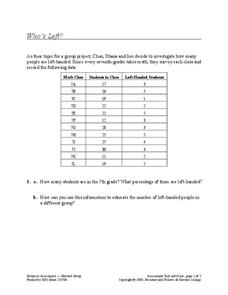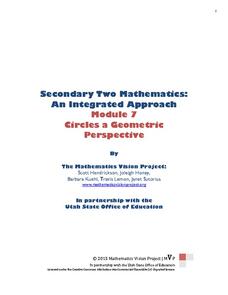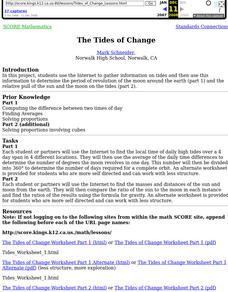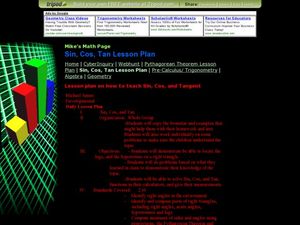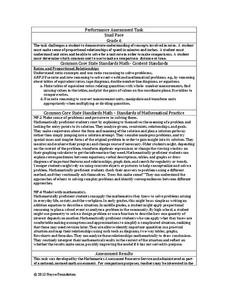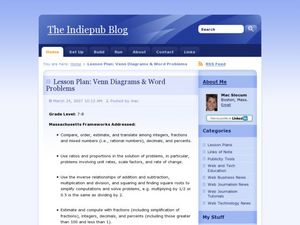Balanced Assessment
Who's Left?
If you're not right-handed, are you wrong-handed? Young statisticians calculate the percentage of left-handed people using a given data set in the assessment task. They plot data on a scatter plot and consider how the line of best fit...
Curated OER
Scaling Down Art
Students change the scale of a work of art using ratios, percentages, and proportions. While this is technically an art lesson, there is quite a bit of mathematics involved in converting to the correct scale.
Mathematics TEKS Toolkit
Grade 6: Exploring c/d = pi
Introduce your math class to the perimeter of a circle. Teach them that pi describes the relationship between the circumference and the diameter. As a hands-on investigation, pairs or small groups use string to compare these two values...
Curated OER
Indirect Measurement, Surveying Trigonometry
Students measure distances using indirect measurements. In this geometry lesson, students apply proportion and ratios to measure heights of different objects. They differentiate between direct and indirect measurements.
Curated OER
Direct Variation
In this algebra worksheet, students solve equations by applying direct variation relationship. They solve problems using proportions and ratios while using direct variation. There are 3 problems with an answer key.
Curated OER
Radian Measure
In this Algebra II/Pre-calculus learning exercise, students explore radian measure of an angle and convert between degree and radian measure. The seven page learning exercise contains explanation, examples, and nineteen multi-part...
Curated OER
Geometry of Triangles Using a Protractor
Seventh graders use a protractor to measure angles and solve a problem involving distance. For this measuring angles with a protractor lesson plan, 7th graders calculate the distance of a line on a diagram by using a protractor to...
Mathematics Vision Project
Circles: A Geometric Perspective
Circles are the foundation of many geometric concepts and extensions - a point that is thoroughly driven home in this extensive unit. Fundamental properties of circles are investigated (including sector area, angle measure, and...
Curated OER
Tides of Change
Students use the Internet to gather information on tides and then use this information to determine the period of revolution of the moon around the earth (part 1) and the relative pull of the sun and the moon on the tides (part 2).
Curated OER
Mathematics In You
Young scholars construct ratios using the hand as data. They use examples of cortical and trabecular bone found in the long bones to measure circumference, diameter, length, and weight of long bones. They perform computations using...
Curated OER
Investigation: The Local Bagel Shop
Sixth graders explore economics by solving business math problems. In this ratio and proportion lesson, 6th graders examine different meals to be purchased at a coffee shop and compare which prices make which meals a better purchase....
Curated OER
Algebra Match
Twelfth graders identify the parts of an algebraic equation. They consider the many uses of algebra in daily life. They play a game, Algebra Match, where student pairs work to solve equations listed on index cards.
Curated OER
Sin, Cos and Tangent
Pupils find the identity o sine, cosine and tangent. In this precalculus lesson, students solve and identify the different parts of a right triangle. They use the ratios of the Pythagorean Theorem to find the missing side or angle.
Noyce Foundation
Snail Pace
Slow and steady wins the race? In the assessment task, scholars calculate the rates at which different snails travel in order to find the fastest snail. Hopefully, your class will move much more quickly in finishing the task!
Curated OER
Scaling Figures Two
In this similar figures worksheet, students find the missing side of the larger figure when the smaller figure's sides are given. Students complete 4 problems.
Curated OER
Identify Similar Figures
Students explore the concept of similar figures. For this similar figures lesson, students develop the idea that similar figures are a different size but the same shape by comparing similar rectangles. Students use patty paper to trace...
Curated OER
Similarity and Congruence
Students explore the concept of similarity and congruence. In this similarity and congruence lesson, students identify and verify whether or not two figures are similar, congruent, or neither. Students use postulates and theorems such as...
Curated OER
Similarity and Congruence
Students explore the concept of similarity and congruence. In this similarity and congruence lesson, students cut out strips of paper and form a triangle. Students try to prove that their triangles are congruent using the SSS theorem of...
Curated OER
Body Building
Pupils determine whether ancient Egyptian drawing was proportional and in perspective by comparing ancient Egyptian drawings, a mummy's x-ray, and contemporary photographs of people.
Curated OER
Eye From the Sky
Students are introduced to the concept of aerial perspective and scale. Students will use satellite technology to view their neighborhoods and sketch the area surrounding their schools. They will take part in a neighborhood walk to view...
Curated OER
Measuring a Mummy Case
Students practice how to calculate volume using mummy cases. They measure using ancient Egyptian, U.S., and metric systems. They explore how to convert measurements into different systems, and discuss ratios.
Curated OER
Converting fraactions and percents
Sixth graders practice the conversion of percents and fractions. They focus on the fact of both fractions and percents are part of a whole. In the independent practice the students also work with solving proportions.
Curated OER
Wings and Othe Things
Students work in groups that are engaged in different activities at different times. They watch the video "Madagascar" and collect data pertaining to the Fish Eagle's arm spam. They work together to perform mathematical computations...
Curated OER
Venn Diagrams & Word Problems
Pupils explore the concept of Venn Diagrams through word problems. In this Venn Diagram lesson, students solve word problems about groups of people using Venn Diagrams. Pupils use survey results about MySpace and Facebook in a Venn...
